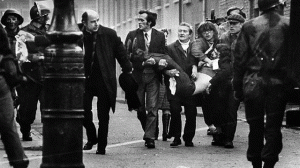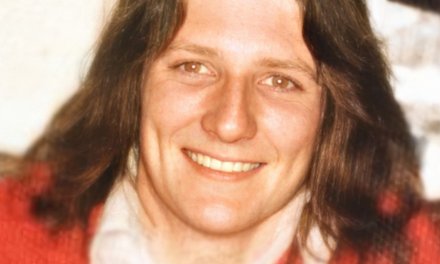Forty years ago Ireland was convulsed by the British army murders of fourteen civil rights demonstrators on the streets of Derry on a day that became known as Bloody Sunday. The march was organised by the Northern Ireland Civil Rights Association (NICRA) which had originally been campaigning for reforms but whose campaign had been met with Unionist state violence and repression, the latest of which was the introduction of internment and the torture of detainees.
And so, on Sunday 30th January 1972 people gathered at Creggan Shops to make their way to the Guildhall for a public meeting on what was, essentially, an anti-internment march, protesting against the imprisonment without charge or trial of civil rights activists, nationalists and republicans in Long Kesh, Magilligan and the Maidstone Prison Ship. However, the way was blocked by British paratroopers who deliberately opened fire, killing young and old alike. The British attempted to justify the massacre by claiming they were fired on by the IRA and were only responding. A few days later a massive crowd in Dublin burnt the British Embassy to the ground and across Ireland young people queued up to join the struggle.
One who witnessed the events of that day was Micky Devine who, nine years later was to die on hunger strike. He was on that fateful march with his brother-in-law, Frank, who recalls: “When the shooting started we ran, like everybody else, and when it was over we saw all the bodies being lifted.” The slaughter confirmed to Micky that it was more than time to start shooting back. “How,” he would ask, “can you sit back and watch while your own Derry men are shot down like dogs?”
Micky had written: “I will never forget standing in the Creggan chapel staring at the brown wooden boxes. We mourned, and Ireland mourned with us. That sight more than anything convinced me that there will never be peace in Ireland while Britain remains. When I looked at those coffins I developed a commitment to the republican cause that I have never lost.”
The significance of Bloody Sunday can never been underestimated. It has been written about and has been the subject of film, dramas, poetry and documentaries. The latest, to coincide with the fortieth anniversary, has been the publication this week on BBC’s History website of archive material which contains interviews with those there on the day and discusses the aftermath of Bloody Sunday and its influence on Ireland to this day.




